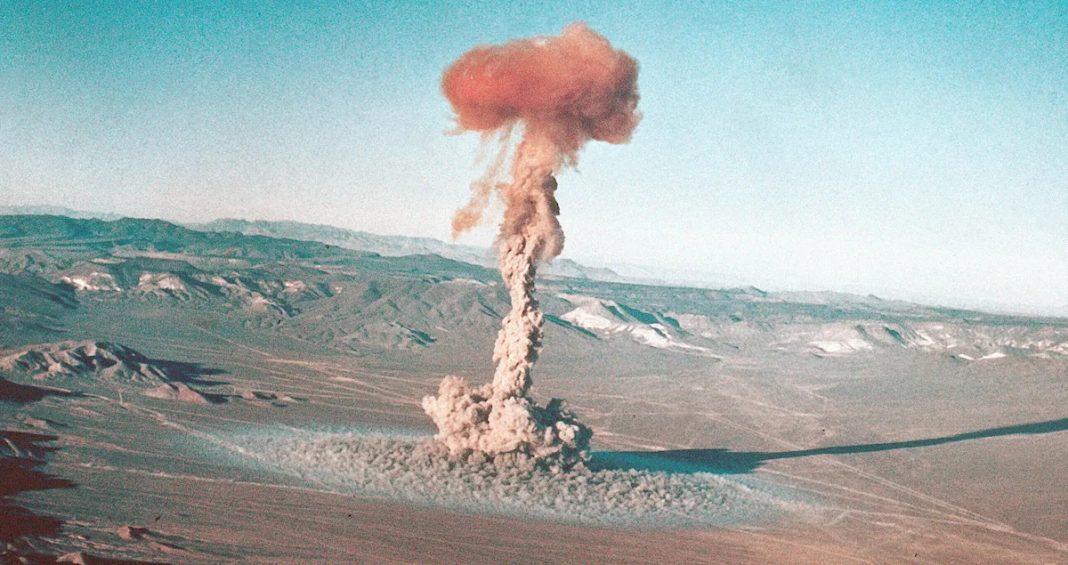In what would be a major shift in a decades-old American policy against global nuclear proliferation, President Trump says he has directed the Pentagon to “start testing” U.S. nuclear weapons “on an equal basis” with other countries, including China and Russia.
“Because of other countries testing programs, I have instructed the Department of War to start testing our Nuclear Weapons on an equal basis,” Trump wrote in a post on Truth Social late Wednesday. “That process will begin immediately.”
It was not immediately clear what type of testing programs Trump was referring to in the announcement, which was made shortly before meeting with Chinese leader Xi Jinping in Busan, South Korea.
Nations with nuclear stockpiles, including the U.S., regularly conduct tests of their nuclear weapons delivery systems, but nearly all have ceased testing nuclear weapons 30 years ago.
Countries test nuclear systems — not weapons
The United States, China and Russia have not conducted tests of nuclear weapons since the 1990s, when the Comprehensive Nuclear-Test-Ban Treaty was adopted by all countries possessing nuclear weapons — except for North Korea, which conducted the world’s most recent nuclear weapons test in 2017.
The U.S. military already tests its nuclear delivery capabilities, but voluntarily halted tests of nuclear weapons in 1992.
According to the Associated Press, China conducted its last known test of a nuclear weapon in 1996.
Russian President Vladimir Putin announced this week that the country had conducted successful tests of the new nuclear-powered Burevestnik cruise missile and an atomic-powered and nuclear-capable underwater Poseidon drone. But per the AP, Russia has not conducted a test of a nuclear warhead since 1990.
President Trump speaks to reporters on Air Force One on Oct. 30. (Evelyn Hockstein/Reuters)
Speaking to reporters on Air Force One on his way back to Washington, D.C., Trump did not distinguish between the tests of nuclear delivery systems and the tests of nuclear weapons themselves.
“They seem to all be nuclear testing,” Trump said. “We don’t do testing. We halted it many years ago, but with others doing testing, I think it’s appropriate that we do also.”
Asked by a reporter where the tests would occur, Trump said: “It’ll be announced. We have test sites.”
According to NBC News, the U.S. has the ability to resume tests at a federal site in Nevada, where its last confirmed nuclear weapons test occurred.
But Trump also told reporters that his goal was “denuclearization.”
“We are actually talking to Russia about that,” he said.
How Russia and China reacted
Trump’s comments about U.S. nuclear testing sowed confusion among officials in Moscow, Beijing and Washington.
“We were not aware that anyone was testing anything,” Kremlin spokesperson Dmitry Peskov told reporters.
“Regarding the tests of the Burevestnik and the Poseidon, we hope that President Trump was correctly informed about it,” Peskov said. “There is no way it can be interpreted as nuclear testing.”
He added: “Of course, if someone abandons the moratorium, Russia will act accordingly.”
Guo Jiakun, a spokesperson for China’s Ministry of Foreign Affairs, said that “China hopes the U.S. earnestly fulfill its obligations under the Comprehensive Nuclear Test Ban Treaty and honor its commitment to suspend nuclear testing.”
What some Congressional Democrats said
Sen. Ed Markey, a Massachusetts Democrat who co-chairs the congressional Nuclear Weapons and Arms Control Working Group, said the U.S. “must not resume” nuclear tests.
“This is a reckless decision that will only make us less safe and lead to a new nuclear arms race,” Markey wrote in a post on X.
Congressional Democrats in Nevada were equally critical.
“Nevadans still remember the nuclear testing era, and it left lasting radioactive contamination across millions of acres of land,” Nevada Sen. Jacky Rosen wrote on X. “Trump’s directive is reckless and dangerous and I’ll do anything I can to stop it.”
When could the U.S. resume nuclear weapons tests?
It’s unclear how quickly the U.S. could resume such tests. A recent report from the Congressional Research Service cited by CNN estimated that it would take 24 to 36 months for the U.S. to test a nuclear weapon.
And the tests of nuclear weapons have historically been conducted by the U.S. Energy Department, and not the military.
Daryl G. Kimball, executive director of the Washington-based Arms Control Association, called Trump’s nuclear weapons policy “incoherent” and the president “misinformed and out of touch.”
“By foolishly announcing his intention [to] resume nuclear testing, Trump will trigger strong public opposition in Nevada, from all U.S. allies,” Kimball wrote on X. “And it could trigger a chain reaction of nuclear testing by U.S. adversaries, and blow apart the nuclear Nonproliferation Treaty.”

